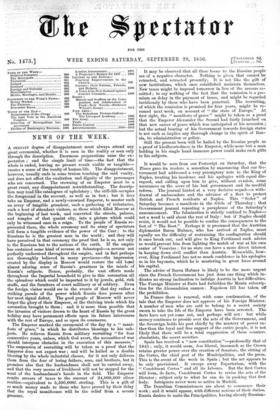NEWS OF THE WEEK.
A =raw degree of disappointment must always attend any great ceremonial, whether it is seen in the reality or seen only through the description. Enormous preparations raise the ex- pectation ; and the simple limit of time—the fact that the whole is ended, leaving no present result visible or tangible— creates a sense of the vanity of human life. The disappointment, however, usually ends in some truism touching the said vanity, and does not affect the exaltation and dignity of the personages who are concerned. The crowning of an Emperor must be a great event, any disappointment notwithstanding. The descrip- tion may read like catalogues of upholstery ; the still-life occupies the foreground in the account, as well as in fact ; but it does take an Emperor, and a newly-crowned Emperor, to muster such an array of tangible grandeur, such a gathering of tributaries, such a host of attendant visitors, as those which filled Moscow at the beginning of last week, and converted the streets, palaces, and temples of that quaint city, into a picture which could only be witnessed once in a reign. To the people of Russia re- presented there, the whole ceremony and its army of spectators will form a tangible evidence of the power of the Czar ; to the Russians he is the greatest man in the world ; and they will have perceived in that ceremony the proof that he is so, not only to the Russians but to the nations of the earth. If the empire has sustained some kind of reverse at Sebastopol—a reverse not perfectly understood throughout the empire, and in fact perhaps not thoroughly believed in many provinces—the impression created by the display in Moscow would restore the old loyal almost adoring sense of Russia's greatness in the minds of Russia's subjects. Hence, probably, the vast efforts made throughout the Imperial household to give to this coronation all the splendour which could be imparted to it by jewels, gold, rich stuffs, and the furniture of court millinery or of soldiery. Even the foreign visitor would see in the events of that day rather a striking parade of the power which Russia does possess after her most signal defeat. The good people of Moscow will never forget the glory of their Emperor, or the thriving trade which his coronation brought to them ; and it is more than possible that the invasion of visitors drawn to the heart of Russia by the great holiday may have permanent effects upon its future intercourse with the rest of Europe, and so upon its commerce.
The Emperor marked the ceremonial of the day by a " mani- festo of grace," in which he distributes blessings to his sub- jects. He relieves Russia from military recruiting " for four consecutive years, unless, which God avert, the necessities of war should interpose obstacles in the execution of this measure." The suspension of recruiting will be taken as a proof that the Emperor does not expect war ; and will be hailed as a double blessing by the whole industrial classes, for it not only delivers them from the fear of losing fathers, sons, and brothers, but it promises also that the husbandman shall not be carried away, and that the very means of livelihood will not be stopped for the want of the husbandman's hands in the field. The Emperor remits arrears of taxes to the amount of 24,000,000 silver roubles--equivalent to 3,500,0001. sterling. This is a gift of so much money made to those who have proved by their delay that the royal munificence will be the relief from a severe pressure. It may be observed that all these boons to the Russian people are of a negative character. Nothing is given that cannot be retracted, and retracted presently. It is not like the gift of new institutions, which once established maintain themselves. New taxes might be imposed tomorrow in lieu of the arrears re- mitted ; to say nothing of the fact that the remission is a pre- mium on delay in the payment of taxes, and might be regarded invidiously by those who have been punctual. The recruiting, of which the remission is promised for four years, might be re- sumed next week, on account of " the state of Europe." At first sight, the " manifesto of grace " might be taken as a proof that the Emperor Alexander the Second had fairly launched on that new career of peace which was anticipated at his accession ; but the actual bearing of his Government towards foreign states is not such as implies any thorough change in the spirit of Rus- sia, its administration or policy.
Still the present boon will be hailed by the Russian people as a proof of kindheartedness in the Emperor, while none but a man holding in his single hand immense power could make such gifts to his subjects.


























